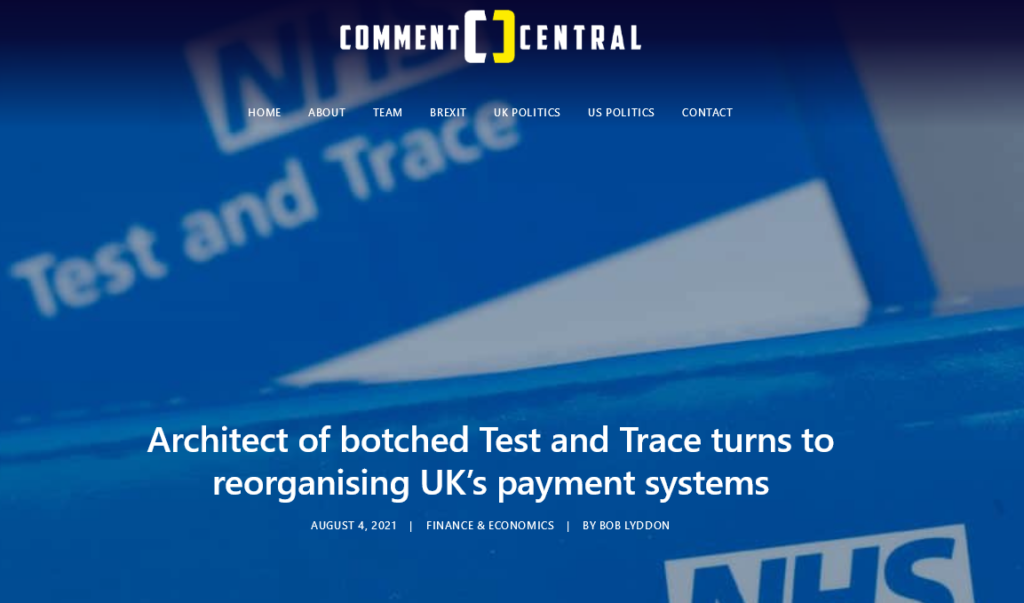
Published on 4 August 2021
A certain David Pitt, fresh from his triumphs as Chief Operating Officer of Test and Trace, has been appointed as Chief Executive Officer of Pay.UK, the company responsible for the UK’s main payment systems.
This is not a joke, although the timing is unfortunate, coinciding with the unfolding pingdemic and its threat to the UK’s food supplies and other essential services.
Mr Pitt has been appointed apparently because of his credentials in managing major change programmes, and there certainly is a seismic change planned for Pay.UK’s systems. Faster Payments, BACS and Cheque&Credit are to move onto the New Payments Architecture or NPA, and adopt the ISO20022 XML payment data format.[1] The Faster Payments component will settle all NPA payments, as opposed to the three systems settling separately at the Bank of England.
This may sound terribly technical and its proponents are happy to make it so, but within this technobabble sit several major public interest issues that have not been properly debated, not least that NPA is predicated on the alleged demand of businesses and consumers to go digital.
NPA will not plug the major loophole in digital payments now: Authorised Push Payment Fraud, Faster Payments being the system most open to it.
In fact Faster Payments will become the anchor system in NPA, which can only raise the incidence of fraud.
NPA will adopt ISO20022 XML without embracing its supposed main advantage: the ability to carry more data than formats like the UK’s Standard-18 as used by BACS. The new data layouts for NPA are “like-for-like” with what exists now, meaning the main benefit will not be grasped for years to come.
The UK cannot expect responsiveness to its future needs as ISO20022 XML is part of a global apparatus, with its own multilateral approval processes for new features. There is limited scope for country-specific enhancements as the global objective is uniformity.
And it gets worse. Not only Pay.UK’s existing systems but also the Bank of England’s CHAPS system will move onto ISO20022 XML. The reason is to achieve conformity amongst the UK systems and also with other countries. This is flawed reasoning in two ways: for good reason payment systems for high-value payments like CHAPS have used a different data standard than ones for low-value payments like BACS. It has been horses-for-courses; now we go to a one-size-doesn’t-really-fit-anything. Then we are told that ISO20022 XML is global and the UK should adopt it because everyone else is. The business cases of authorities in the USA and Canada for adoption mirror the UK’s: they are adopting it because we are adopting it. No-one is adopting it for its inherent advantages but for ‘groupthink’-style conformity with one another.
The first adoption of ISO20022 was for the Eurozone’s Single Euro Payments Area (SEPA), with first rollout in 2008. End-users, however, rejected it due to the lack of a financial business case for retiring legacy schemes and adopting a new one with fewer features. The EU’s response was compulsion. Regulation 260 of 2012 forced end-users to spend to adopt a worse product, and stopped them shopping elsewhere: the regulation set an impossibly high bar for any competitor to introduce a rival to the SEPA credit transfer and direct debit schemes and to ISO20022. Competitor offerings had to enjoy Day 1 adoption by a majority of banks in a majority of Eurozone countries or their usage was illegal. The SEPA schemes and ISO20022 were thereby granted a monopoly.
Effectively that is what will happen in the UK – compulsion to invest in order to adopt a service that is no better in terms of feature-and-function and may actually be inferior, and which will enjoy a monopoly over UK credit transfers and direct debits.
Does this sound like post-Brexit Britain? We adopt the EU’s payment data standard. We vote to roll back the influence of the EU only to allow the self-same thing to be rolled back over us by global bodies marching to the same drumbeat. We dictate conformity of service components to exclude new competitors. We grant a de facto monopoly over an artery of our economy to a single privately-owned supplier in Pay.UK. We permit the COO of a total public fiasco to step straight into the control seat of another major national project.
No, it doesn’t, but these matters have been decided upon
without a public debate at a level commensurate with their implications, which
are significant and national. There is still time to abort NPA: 4 years in, no
Rubicon has been crossed. Ministers need to justify NPA and ISO20022 XML to the
House of Commons and through the House of Commons to the country at large
before Mr Pitt is permitted to test his ability to sink our current payment
systems without trace.
[1] Output of numerous global organisations in addition to ISO itself, such as the SWIFT cooperative, the Bank for International Settlements, the Financial Stability Board, the Committee for Payment Market Infrastructures, the Payment Market Practice Group, the Wolfsberg Group and the Financial Action Taskforce
